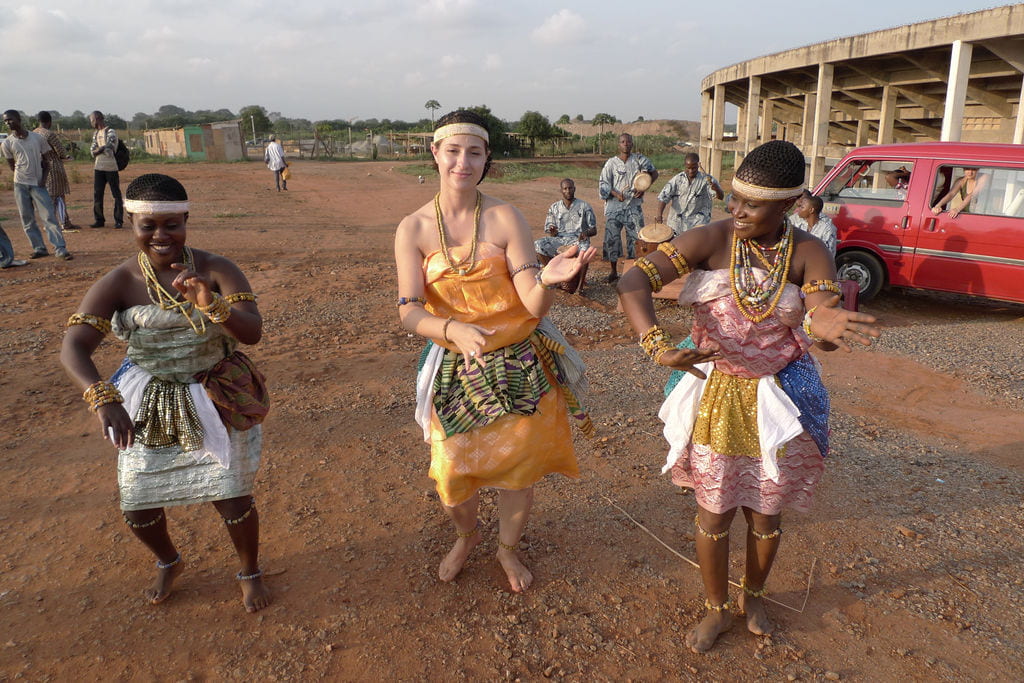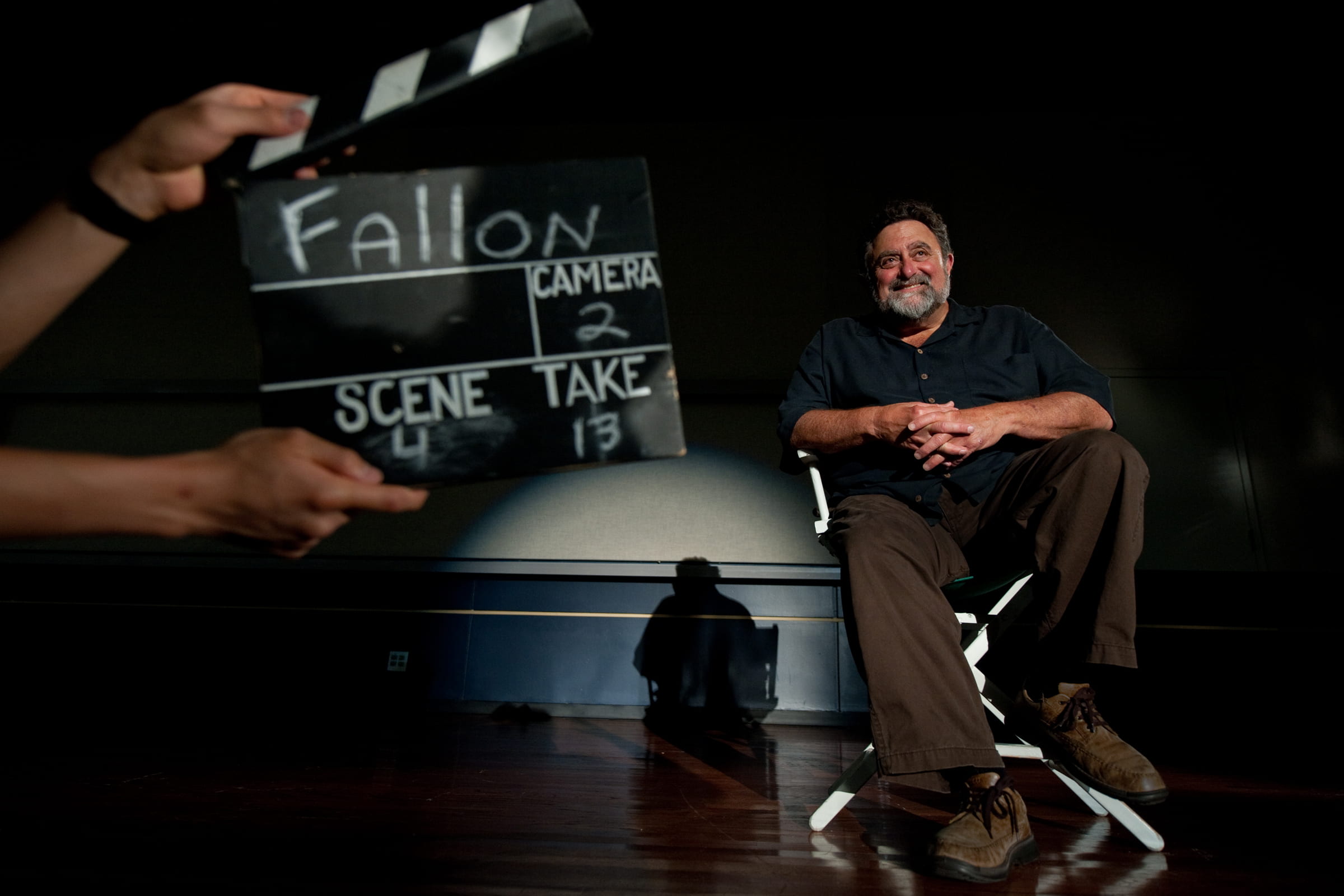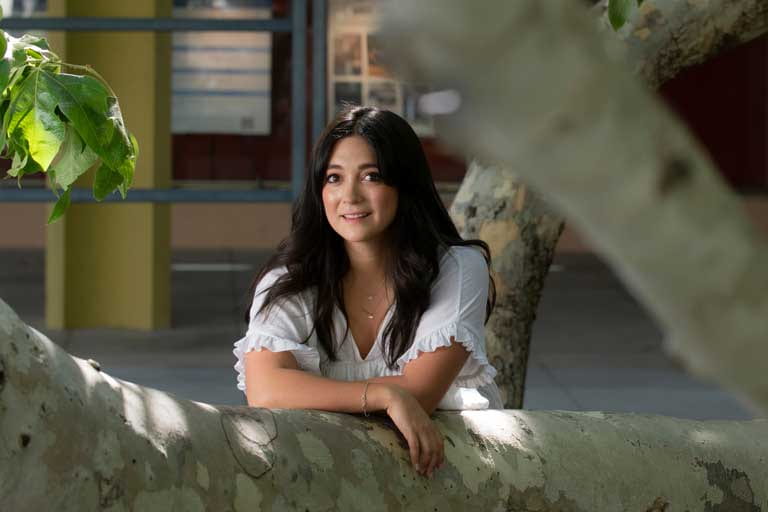UCI, Ghanaian students dance away their differences
Visits engender friendship between UCI arts students and their Ghanaian counterparts.

Gabrielle Castro believes art can be a unifying force. She experienced this in a memorable way during a trip to Ghana last summer with a UC Irvine contingent of dancers and scholars.
A senior studying dance, English and linguistics, Castro embarked on the journey to explore the role dance has played in forming Ghana’s cultural identity.
“The Ghana Dance Ensemble was started in 1962 – just five years after Ghana’s independence from Great Britain – partly to build a more unified country,” she says. “I’m interested in peacemaking opportunities through dance and art, and Ghana is a fascinating place to learn how art can bring people together.”
For three weeks, 16 undergraduate and graduate students and faculty in dance, history, political science, international studies and anthropology conducted research and performed with the Ghana Dance Ensemble – a collaboration of the Ghanaian government and the University of Ghana’s Institute of African Studies.
Sheron Wray, assistant professor of dance at UCI’s Claire Trevor School of the Arts, leads the ongoing project, called “Collaborative Conversations on the Continent.” She says it “furthers the University of California objective of a global village by encouraging intellectual exchanges beyond the boundaries of the formal classroom.”
Since the trip, UCI students have maintained their friendships with Ghanaian professional artists, students and professors via Facebook and have continued to study West African dance, music and culture through monthly “Ghana Nights” on and off campus.
In celebration of Black History Month (February), UCI hosted a delegation from the University of Ghana’s dance department for a series of performances and seminars examining Africa-U.S. links through dance, music and critical thought.
The events were co-sponsored by UCI Ghana Project 2010, Department of History, Department of Dance, Office of the Vice Chancellor for Student Affairs, Center for Global Peace & Conflict Studies, Office of Equal Opportunity & Diversity, International Center for Writing & Translation, Program in African American Studies, Black Student Union and Department of Spanish & Portuguese.
Jessica Millward, assistant professor in the Department of History and a founding member of the UCI Ghana Project, announced the creation of a biannual conference celebrating the creative and scholarly work of students from both institutions whose research focused on the African diaspora. The conference – hosted by the Department of History and Program in African American Studies – will take place at UCI during Black History Month.
Oh! Nii Sowah, an alumnus of UCI’s M.F.A. program in dance and chair of the University of Ghana dance department, delivered a lecture Feb. 1 entitled “Dance, Diaspora & Community Resilience.”
He discussed how dance could unite disparate groups. “Lack of knowledge about each other causes so many problems,” Sowah said. “When we dance, we forget about our differences and enjoy our diversity.”
UCI Distinguished Professor of English and comparative literature Ngugi wa Thiong’o made an appearance at the end of Sowah’s talk. The prolific Kenyan author presented signed copies of his childhood memoir, Dreams in a Time of War, to the visiting Ghanaian students.
“This is a little something for them to carry home,” Ngugi said. “All arts are about dreaming. You dream to change the world. You dream to achieve.”
Traveling and studying dance in Ghana has had a lasting impression on the UCI students, Wray says. “There’s a sense of confidence that has grown in many of them, an assuredness and sense of purpose in their dancing,” she says. “They have acquired some more freedom of movement.”
Krystal Pires-Patch, a fourth-year dance and drama major, studied gender roles in Ghanaian dance and was surprised to learn that males rule the art form there. “Men really influence and dominate the professional dance culture,” she says. “Women prioritize having and raising kids.”
She wants to one day live and work in Ghana. “Culturally, one of the things that blew me away was the strong sense of community,” Pires-Patch says. “They accepted us as family right away.”
Wray hopes to organize future trips to Ghana for UCI groups. “It’s been extraordinary,” she says, “seeing how students have maintained their network and interest in a culture they’ve experienced.”


